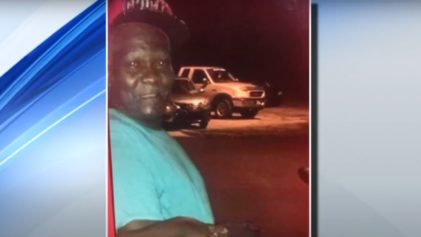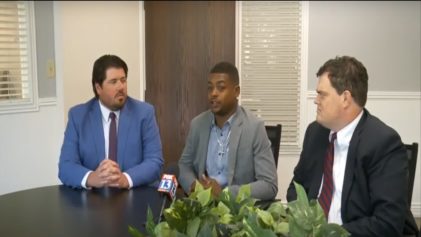After one too many incidents of Black people dying at the hands of police, an Atlanta man decided it was time to create an app that would revolutionize the way people document their encounters with law enforcement.
In 2015, Mbye Njie launched his Legal Equalizer app with the hopes of holding officers accountable, curbing racial profiling, and educating civilians on their legal rights.
The Gambia native and metro Atlanta resident told Atlanta Black Star the inspiration behind the app came from his own encounters with police, as well as the recent police shootings of African-American men across the country.
“The inspiration for it came from a few things,” Njie told ABS. “I had been thinking about an app for the few months leading up to it, because that was right around the time we had [the] Mike Brown [shooting]. We’d just seen John Crawford, we just saw Tamir Rice, and we’d seen Eric Garner that summer. And my Facebook wall was just full of arguments from different sides, different perspectives.”
Thus, the idea for Legal Equalizer was born.
The revolutionary app has three key features: a button to record the user’s encounter with police, an SOS button to notify friends and family of the user’s whereabouts, and a section listing the user’s legal rights based on GPS location.
According to the app’s official website, users can begin filming as soon as they launch the app, after which a copy of the recording is sent to each of their three emergency contacts. Once the app is opened, users can also access a list of their rights, along with local and state laws. If things go awry at any point during the encounter, users can hit the panic, or SOS, button alerting their emergency contacts via text that they’ve been pulled over. GPS coordinates of the user’s location are sent as well.
Njie said his original goal was to create an app that showed what it looked like when he got stopped by police.
“…When [I] first started planning, I wanted to show people what it looked like when I got pulled over, and show them how I behave and how I get treated,” he said. “That was the whole video aspect of the app. That’s what we first started with.”
“The recording is actually saved on the app as well,” Njie continued. “So let’s say your phone was destroyed, or the battery died. All you have to do is get another phone and log back in, and the video will be saved on there.”
The app creator recalled getting pulled over in Atlanta four times within two weeks in December 2014. Njie said it was the fourth time that really made him fed up, as the officer handcuffed him and informed him there was a warrant out for his arrest.
He was released after 30 minutes, but Njie returned with his mother to file a complaint against the officer. However, the department’s response wasn’t the one they were looking for.
“The officers there pretty much told us that profiling was legal, that officers had the discretion to pull over who they wanted to,” Njie said.
That was when he saw a need to create an app that let users record police encounters, he explained.
As he began pitching the idea to his friends, many voiced concerns over a family member or loved one getting pulled over and them being left in the dark about their whereabouts.
“And so that’s where we got the idea of having that [SOS] button, where they hit it and it lets people know ‘I’ve been pulled over,’ ” Njie explained. “And that aspect got set in stone for me…after the Sandra Bland case. Because with that case, I was adamant that had she sent a text to her parents and her sister letting them know that she’d been pulled over and where she was, she wouldn’t have been in jail until Monday without hearing from them or anything.”
When users push their SOS button, the app sends out a text that reads: “I was stopped by the police. I am currently okay, but if you do not hear from me, please contact the police department. My location is…[current GPS location].”
While the video recording and SOS button are both vital features on the app, Njie’s decision to provide a list of local laws and regulations serves a larger purpose of making sure users are well informed of their rights. The former Apple salesman said the idea to include such a feature came from talking with his old college friends, who were often stopped by police while they were away at school at North Carolina’s Davidson College.
“Every time myself or one of my Black friends went off campus, we would get pulled over or harassed by local police probably about, I’d say anywhere from four to six times out of every 10 times we went,” he said. “When we get pulled over for something, they’d want to search us. They didn’t believe that we went to the school unless we had our school IDs. So it was just harassment after harassment.”
Njie and his friends finally got fed up and decided to go the library and print out the Bill of Rights. They took it a step further by printing copies of North Carolina state law. The college students even went to the town of Davidson and printed out its local jurisdictional laws.
After educating themselves and demonstrating their knowledge of the law to officers when they were pulled over again, Njie said the unwarranted stops and searches eventually ceased.
“They quit pulling us over completely because they realized, ‘OK, that’s the car they’re in. They know what they’re talking about,’ ” the entrepreneur said. “And so that’s where I saw the power of knowing the laws, and your rights, and things like that.”
While the Legal Equalizer app promotes transparency during police encounters, Njie said he didn’t want it to come off as if he were anti-police. So he spoke with a few local officers and asked for tips on what civilians could do to prevent the escalation of a police encounter. Those suggestions are also included on his app.
Njie continued to develop Legal Equalizer and eventually quit his job in sales to devote his full time and attention to the app. Because he didn’t have a background in coding or app development, he reached out to an old co-worker who then linked him with a developer named Martin Davis.
“So I talked to him about [the app] in February, and then by March he had a prototype for it, so it was actually working,” the entrepreneur said. “He built it himself. So we were at that point and were like cool, we can start going.”
However, just a week after the prototype was created, the duo hit a snag. The American Civil Liberties Union had just released a similar app called Mobile Justice on which users could record their interactions with police. Njie said he downloaded the app and immediately saw that while the apps were similar, they still had some major differences. He and Davis then continued working on their app.
Njie said it was a struggle to finance the development of the app as well.
“I tried to join a few groups here in Atlanta, a few different organizations that would help me raise the money or help me get it out,” he explained. “But it was just [procrastination] and they kept on taking their time and giving me the run around. So finally, I was like ‘You know what, I’m gonna make a GoFundMe.’ ”
Legal Equalizer’s GoFundMe page raised a couple grand within the first few weeks. But it wasn’t until Njie reached out to an old friend, who happened to be an editor at the Huffington Post, that the page experienced an influx of donations. The Atlanta man said his friend got one of her writers to cover his story, and the rest was history.
The page ultimately raised $60,000, which Nijie said is way below what it costs to develop an app.
“When you look at the average cost of [developing an] app, people are paying $150 to $200,000 on average,” he said. “And that’s normally on one platform. We’re on two.”
Njie explained that he and Davis were able to work with $60,00 to build the app on both the Android and iOS platforms. They stretched the money as far as they could, as Davis did much of the coding for free. When they did need extra help with coding, Njie said the labor was inexpensive.
Legal Equalizer is currently free on both iOS and Android, and the entrepreneur said he plans to keep it that way. To monetize the app, however, Njie said he is working to sell advertising to local attorneys and bail bondsmen. Whenever a consumer uses the advertised services, the attorney/bondsmen will get a return on their investment.
“We’re gonna be adding immigration laws in there, so that’s also advertising on a federal level,” he said.
For Njie, the next step is finding an investor to help him grow and expand the app.
“…We’ve been stuck for a while now just trying to find somebody to sit down and say ‘Hey, let me listen to what you have, show me how we can monetize this, how we can improve it.’ ”
The Legal Equalizer app is off to a great start, boasting over 50,000 downloads on both iOS and Android, according to Njie. The entrepreneur said he’s now working on improving, differentiating and adding new features to the app.
Over the next five years, he plans to add pop-up data and statistics that let users know how often traffic stops occur in a given area; live streaming from phone to phone; live streaming from phone to police station; and the ability to view an officer’s record by typing his/her badge number into the app.
“My ultimate goal is to take this internationally,” Njie said. “…We can actually expand this and put a stop to this [police brutality.] Or if not stop it, slow it down significantly.”


